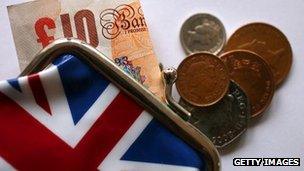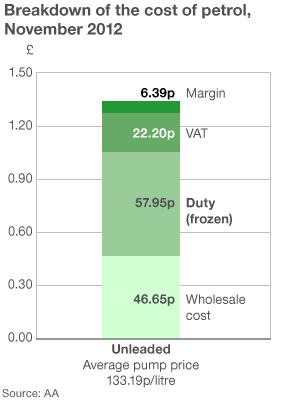Q&A: How will the Autumn Statement affect you?
- Published

The Chancellor, George Osborne, has delivered the coalition government's latest plans for taxing and spending, in his annual Autumn Statement.
In reality, it is a mini-Budget.
So, what does it mean for the pound in your pocket?
What's happened to taxes?
Many lower paid workers will find themselves paying less income tax.
The personal allowance, the amount that most people can earn before they pay income tax, will rise to £9,440 in April 2013.
That is £235 more than the chancellor had previously said, and will represent a total rise in the allowance since April 2012 of £1,335.
What does this mean for people paying the basic rate tax of 20%?
In the current tax year (2012-13) they enjoy the current personal tax allowance of £8,105 and are then taxed at 20% on the next £34,371 of their income, thus their obligation to pay the higher rate tax of 40% starts at £42,476 of their income.
In the budget earlier this year it was decided that as they would benefit from a raised £9,205 personal allowance from April 2013, the higher tax rate of 40% would kick in at a lower point of £41,450, dragging more people into the higher-rate tax bracket.
In effect, the slice of income that can be taxed at 20% continued to shrink, standing at the £32,245.
The Autumn Statement has changed things, again.
With the personal allowance now rising next April to £9,440, the slice of income to be taxed at 20% has been cut back, to £32,010.
This keeps the trigger point for 40% tax rate at £41,450.
The chancellor said this threshold for the 40% rate will now rise by 1% in 2014 to £41,865, and then to £42,285 in April 2015.
However, as average earnings are likely to rise by more than this, more people are going to see the top slice of their earnings drift into the higher rate tax bracket - a process known as fiscal drag.
Investors will also see some benefit from the latest changes, with the annual exempt amount for capital gains tax rising by 1% to £11,100.
The inheritance tax nil-rate band will rise too, from £325,000 to £329,000 in 2015-16.
How will my benefits change in April?
Millions of people claim state benefits of one sort or another, and many working age benefits will rise by 1% in April.
That is probably going to be a cut in real terms though, as it is below the current level of inflation, which is 2.7% under the Consumer Prices Index (CPI) measure.
It is also below the September CPI level of 2.2% which is often used as the benchmark for the uprating of benefits.
Benefits such as Jobseeker's Allowance, employment and support allowance, and income support, as well as maternity, paternity and adoption pay, will rise by 1% for the next three years.
That will mean the weekly £71 jobseekers' allowance is likely to rise by 71p a week, rather than £1.56 next year.
Meanwhile child benefit will rise by 1% for the two years from April 2014 - it is frozen until then.
Anything for savers?

Yes. The overall annual Isa contribution limit will rise modestly from the current level of £11,280 to £11,520 from April 2013, a rise of 2.1%.
The chancellor had previously said this would be increased in line with inflation.
What about pensions?
The basic state pension will rise by 2.5% next year to £110.15 a week.
Meanwhile, the two main limits on tax relief for pension saving are being reduced, again, although this will mainly affect the top 1% of pension savers.
From 2014-15, the lifetime allowance for tax-free pension saving will be cut from £1.5m to £1.25m, and the annual allowance will be cut from £50,000 a year to 40,000.
Savings made above these limits will, as now, be taxed.
The chancellor said by 2016-17 this would recover about £1bn of the tax relief currently given away to people saving in pension schemes.
And drivers?
The chancellor drew cheers from his colleagues when he simply decided to do away with a scheduled rise in tax on petrol.
The planned 3p per litre rise in fuel duty, which was due to be introduced next month, has been cancelled.